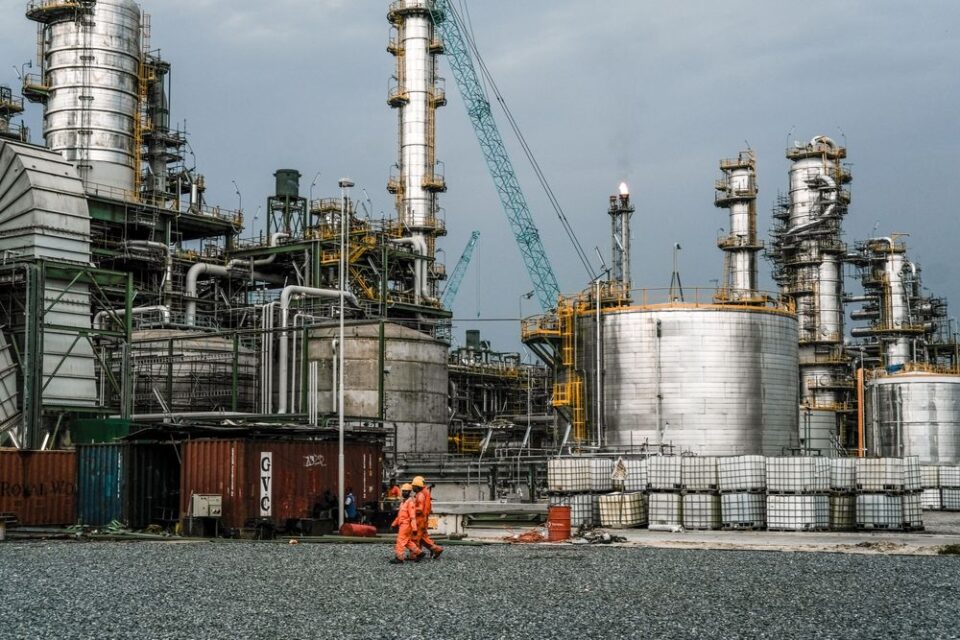By Chukwuma Okoli & Ndu Nwokolo
On May 22, 2023, the $20 billion Dangote refinery was inaugurated in Lagos with great fanfare. With a daily production capacity of 650,000 barrels, it was anticipated that local refining by the Dangote refinery would end Nigeria’s fuel importation, opaque fuel subsidy regime, fuel shortages, price hikes, and many other challenges associated with the downstream sector of Nigeria’s oil industry. Over one year after the inauguration and with the commencement of production by the Dangote refinery on September 15, 2024, challenges relating to fuel importation and price hikes have remained features of the downstream sector of the Nigerian oil economy.
Building a local refinery in Nigeria promises many opportunities for investors, the Nigerian government, and the general public,at least in theory.
However, recent experience with the Dangote refinery in Nigeria tends to question the promises of local refining. Nigeria is currently the 13th largest crude oil producerglobally, with combined crude oil and condensate reserves reaching 37.50 billion barrels as of January 1, 2024. Nigeria is also one of Africa’s largest consumers of refined products, accounting for over 7% of Africa’s consumption of refined products. The country consumes over 17 billion litres of PMS annually, with transportation and power being the major drivers of demand for PMS. Meanwhile, Nigeria imports more than 80% of the refined products it consumes because the publicly owned local refineries are comatose. Against this backdrop, the Dangote refinery was expected to mutually benefit Dangote as an investor, the Nigerian government and local consumers. Unfortunately, this has not been the case, especially for the consumers. The anticipated benefits of local refining in terms of pricing are yet to be felt by the local consumers whose hope of buying refined products at cheaper rates seems to have been dashed. This has kept some Nigerians wondering if the Dangote refinery is just something less than nothing. That is, whether the situation would have been better if the local refinery was not established. This edition of the Nextier SPD Policy Weekly explains why Nigerians’ hope for cheaper refined products from Dangote’s refinery may be stillborn, at least in the short term.
* Nigeria’s Oil Industry: A Source of Affliction
Nigeria is a rentier state, with the oil and gas sector contributing about 65% of government revenue and over 85% of total exports. As a rentier state, the Nigerian government, which is the principal recipient of the external rent, has securitised the oil industry in ways that enrich only a few political and prominentelites but serve as a source of affliction for the poor majority.The affliction of oil-bearing communities through the destruction of their environment and sources of livelihood by upstream activities of the oil industry has been adequately documented by Ibeanu (2008) and many other writers. Meanwhile, the (mis)governance of the downstream oil industry is even causing Nigerians more affliction. The downstream oil industry involves refining, distributing, and marketing petroleum products and natural gas. Regarding refining, Nigeria’s publicly owned refineries, with a total production capacity of 445,000 barrels per day, have failed to meet the local demands of crude oil due to poor maintenance, which has led to their total collapse. The inability to refine locally led to importing refined products for local consumption. Yet, the importation and distribution of refined products have been characterised by corruption in subsidy and the diversion of imported products to other countries. Nigeria spent ₦2.0 trillion and ₦3.6 trillion on fuel subsidies in 2022 and 2023.
A major challenge of the subsidy is the opaque character of the subsidy regime, given the lack of accurate data on the amount of fuel imported into the country, which makes it impossible to know how much fuel is being subsidised. More so, the porous nature of the national borders coalesces with the corruption in the downstream sector to enable the smuggling of some of the subsidised products. For instance, it is estimated that 15.64 million litres of petrol are smuggled out of Nigeria daily.
In 2021, the PIA was enacted to address some of the inefficiencies in the oil industry. Still, the PIA could not address the challenges of local refining and transparency in the subsidy regime.
On May 29, 2023, President Bola Ahmed Tinubu announced the removal of the subsidy; this immediately saw the price of a litre of fuel jump from ₦197 to between ₦480 and ₦570. In line with the subsidy removal, in July 2023, the petrol pump price was subsequently reviewed upward to ₦617/litre. Generally, what we can deduce from the downstream sector of the Nigerian oil industry are: that the poor governance of the downstream oil sector has engendered and sustained inefficiencies in refining, distribution and pricing of refined petroleum products; removal of fuel subsidy without addressing inefficiencies in the downstream oil sector has continued cause economic hardship on Nigerians as the costs of transport and other basic commodities have increased; the corruption and inefficiencies in the downstream sector of the oil industry also have negative implications for investors as the interest and powers of the elites in the oil industry may thwart efficient operation by private local refineries. Recent experience with the Dangote refinery supports this last deduction.
* Dangote Refinery: Expectations and Frustrations
A lot of expectations followed the inauguration of Dangote refinery in 2023. On his part, Alhaji Aliko Dangote had expected that his refinery could buy crude locally from Nigeria through the NNPCL to commence production. On the part of the public, a major expectation was that fuel prices would crash when the Dangote refinery eventually began production. Unfortunately, things have not gone as expected. Aliko Dangote’s frustration began when his refinery could not get enough crude oil supply from NNPCL at an affordable price. For instance, for September 2024, the NNPCL was able to allocate only six cargoes of crude oil to the Dangote refinery out of the 15 cargoes the refinery requested. More so, the Dangote refinery complained that they buy crude oil from international traders at additional costs of about $3-$4 premium per barrel, which translates to $3-$4 million per cargo. This is contrary to the expectation that the Dangote refinery would get an adequate supply of crude oil at a cheaper from NNPC and, if possible, in Naira. The implication of the shortage of crude supply to the Dangote refinery and the extra costs it incurs buying from international traders is that Dangote would have to resort to importing crude, and its product cost would be higher, perhaps higher than the imported products.
The Nigerian public’s frustration revolves around rising fuel prices despite the commencement of production and lifting of fuel from the Dangote refinery. Fuel prices have rather increased as the Dangote refinery commenced production. On September 16, 2024, the NNPC new fuel pump price ranged from ₦950.22 to ₦999.22 per litre, depending on the location. With this adjustment, fuel prices soared to between ₦1,250 and ₦1,500 in various fuel stations across the country. This increase in prices cut short the expectation of Nigerians, who had expected that the commencement of lifting fuel from Dangote would crash fuel prices.
The failure of domestic fuel production by the Dangote refinery to meet the expectations of Nigerians is connected to the rentier character of the Nigerian state, which manifests in the penchant of the government through the NNPCL to ensure local production does not cut short the rents it earns from crude oil sale. This explains why, on the commencement of production by the Dangote refinery, the NNPCL initially assumed a monopoly over the purchase and distribution of refined fuel from the refinery. Through this monopoly, the NNPCL established opacity over the price of fuel as it is not clear how much it buys refined fuel from the Dangote refinery. Even though major marketers are now allowed to lift from the Dangote refinery, they do so under the arrangement entered into between NNPCL and the Dangote refinery. This means that NNPCL still has some form of monopoly over the purchase of refined fuel from the Dangote refinery. This monopoly and opacity by NNPCL undermine the spirit and letters of the deregulation of the downstream oil sector in Nigeria. The lack of transparency in the pricing of refined fuel purchased from the Dangote refinery has ignited accusations and counter-accusations between NNPCL and the Dangote refinery over the cost of crude supplied to the Dangote refinery and the cost of fuel the refinery sells to NNPCL. What this also means is that some vested interests in Nigeria’s oil economy may be at work to ensure that local production by the Dangote refinery does not jeopardise the economic interests of those involved in the business of importing crude oil into Nigeria. If such vested interests are allowed to dominate, then the Dangote refinery may be something less than nothing because Nigerians may not enjoy the anticipated benefits of local refining in terms of cheaper pricing.
* Recommendations
1. Implement full deregulation of the downstream sector of the oil economy: The Nigerian government should implement full deregulation of the downstream sector of Nigeria’s oil economy by allowing other marketers to buy refined fuel from Dangote refinery.
2. Full privatisation of the publicly owned refineries:Given the visible inability of the Nigerian government to revive the publicly owned refineries, those refineries should be fully privatised to enable private investors with proven capacity to take over those refineries. This will deepen competition in the downstream oil sector and reduce the challenges of shortages and price hikes.
3. Prioritise supply of crude for local production: The NNPCL should prioritise the supply of crude oil to the Dangote refinery for local production. The promise of selling crude oil in Naira to the Dangote refinery should also be kept to. This would reduce the price of refined products coming from the refinery.
* Policy Recommendations
1. The Nigerian government should implement full deregulation of the downstream sector of Nigeria’s oil economy.
2. There is a need for the full privatisation of publicly owned refineries.
3. The NNPCL should prioritise the supply of crude oil to the Dangote refinery for local production.
* Conclusion
For many Nigerians, the inauguration of the Dangote refinery and the eventual commencement of local production by the refinery is ‘something less than nothing.’ This is because the expectations that local refining would reduce fuel prices havenot been realised. Instead, the commencement of lifting refined fuel from the Dangote refinery added to the suffering of Nigerians. It immediately led to an increase in the price of fuel following the adjustment of fuel price by NNPCL. This failure of the Dangote refinery to meet Nigerians’ expectations is connected to the rentier character of the Nigerian state, which has made Nigeria’s crude oil a source of affliction for the masses.
(Dr. Chukwuma Okoli is an Associate Consultant at Nextier and a Lecturer at the Political Science Department at Nnamdi Azikiwe University, Awka, Nigeria; while Dr. Ndu Nwokolo is a Managing Partner at Nextier and an Honorary Fellow at the School of Government at the University of Birmingham, UK.)



